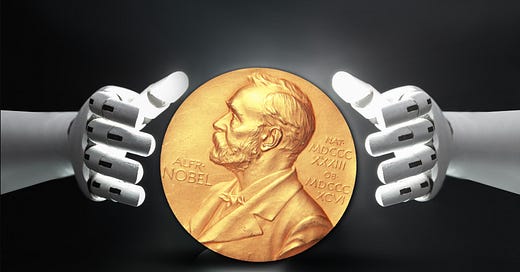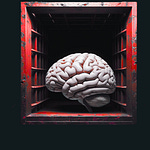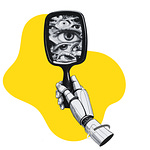AI Takes Home the 2024 Nobel Prizes
This year’s awards to AI pioneers have sparked debate. Should the Nobel Committee recognize computer science in 2025?
Just a few days ago, I was explaining how AlphaFold works to a friend. As a former biochemist, I know all too well how much time it has saved our fellow scientists in the research process.
I was genuinely amazed by how accessible and user-friendly the platform is.
After ten years away from the world of spending countless hours in the lab wrestling with protein cloning and purification, concentrating on protein solutions, and preliminary crystallization trials, until you reach X-ray crystallography analysis…
Using AI to predict protein structures felt like stepping into the future. Exploring AlphaFold made me appreciate the brilliance of AI's real application.
If you didn’t know yet, the 2024 Nobel Prizes in Physics and Chemistry have both honored pioneers in AI. This is a significant shift in how we recognize and value contributions to science and technology!
I’ve been following the news closely on the Nobel Prize. There are questions and disputes about whether AI researchers should receive the Chemistry or Physics Nobel Prize.
Personally, I fully appreciate the winners, but I also understand where the questions come from. And this is something I want to discuss here.
This article starts by highlighting the 2024 Prize winners and their contributions. Then, I want to discuss with you:
Should an AI researcher receive a prize in subjects like Physics and Chemistry?
Should there be a computer science prize instead?
Should AI be part of the research and judging process?
AI Pioneers Claim the Nobel Spotlight
The Nobel Prize in Physics 2024
First, a heartfelt congratulations to John J. Hopfield and Geoffrey E. Hinton on receiving the Nobel Prize in Physics.
Hopfield’s work on associative neural networks, known as the Hopfield Network, has been a cornerstone of AI research and has significantly influenced fields like molecular biology and neuroscience — areas that are particularly close to my heart. His insights into memory and data models have paved the way for the neural network architectures we rely on today as the cornerstone of current AI.
Geoffrey Hinton, often dubbed the “Father of Deep Learning,” has been instrumental in advancing neural network research. His work on backpropagation in the 1980s laid the groundwork for neural networks to learn and adapt, which is fundamental to today’s AI applications. I’m especially interested in his attitude toward the potential risks of AI and Sam Altman, a topic we could explore another day.
Without these two visionaries, we might not have ChatGPT to play with. What a scary thought ;)
If you’re interested in learning more, here’s my Perplexity page on why J. Hopfield and Geoffrey E. Hinton received the Nobel Prize in Physics.
Hinton’s reaction to winning was humble and amusing. When he got the call from the Nobel Prize, he suspected a scam:
My very first thought was, how could I be sure it wasn’t a spoof?
Then, the interviewer asked a question I think many people would like to know and the main topic I want to discuss here:
How would you describe yourself? Would you say you were a computer scientist or a physicist trying to understand biology?
Hinton’s reply:
I would say I’m somebody who doesn’t really know what field I am in, but would like to understand how the brain works… To understand how the brain works, I’ve got to create the technology that works surprisingly well.
The Nobel Prize in Chemistry 2024
The Nobel Prize in Chemistry was also awarded to AI researchers — David Baker for RosettaFold and Demis Hassabis and John Jumper for AlphaFold.
Here’s my Perplexity.ai page on why the Nobel Prize in Chemistry 2024 went to Baker and Hassabis.
AlphaFold, simply put, is a system researchers can use to predict the 3D structure of proteins from amino acid sequences — a task that was once complex and time-consuming.
How time-consuming are these tasks? To give you some idea:
Without AlphaFold, Determining a protein’s structure typically takes 4 to 8 months, sometimes longer. This includes Protein Production and Purification, Crystallization, Data Collection, Model Refinement, and Validation.
If you fail in any one of these steps, you have to try again. Ah… the good old days in the lab.With AlphaFold, Structures can be predicted in days, dramatically speeding up research and discovery.
You can read more about AlphaFold’s achievements on DeepMind’s press page.
Let’s use an example you likely have felt at some point: COVID.
During the early days of the COVID-19 pandemic, I remember reading about how DeepMind’s team released their predictions to help combat the virus. They accurately predicted the structures of several SARS-CoV-2 proteins, aiding researchers in understanding the virus better and accelerating the development of treatments and vaccines.
It’s a testament to how AI isn’t just an abstract concept but a tool actively changing lives.
Here’s the entry for the AlphaFold 3 Server you can play with, by simply logging in with your Google account.
Here’s one of a CoV protein (ORF3a) amino acid sequence that you can copy-paste to the AlphaFold page and trial run the structure:
MDLFMRIFTIGTVTLKQGEIKDATPSDFVRATATIPIQASLPFGWLIVGVALLAVFQSASKIITLKKRWQLALSKGVHFVCNLLLLFVTVYSHLLLVAAGLEAPFLYLYALVYFLQSINFVRIIMRLWLCWKCRSKNPLLYDANYFLCWHTNCYDYCIPYNSVTSSIVITSGDGTTSPISEHDYQIGGYTEKWESGVKDCVVLHSYFTSDYYQLYSTQLSTDTGVEHVTFFIYNKIVDEPEEHVQIHTIDGSSGVVNPVMEPIYDEPTTTTSVPLCongratulations … you have just replicated 4 to 8 months of labwork.
Should There Be a Nobel Prize in Computer Science?
Continuing from where we left off, this year’s awards have sparked a fascinating debate:
Should there be a Nobel Prize dedicated to computer science?
and
Should AI researchers receive Physics and Chemistry — or even other fields’ — Nobel Prizes?
As you may have noticed, the Nobel Prizes historically recognize achievements in Physics, Chemistry, Medicine, Literature, Peace, and Economic Sciences, but computer science is notably absent from this list.
Are the Traditional Nobel Categories Still Relevant?
You might wonder why these particular fields were chosen in the first place.
I thought, “Is it because they are fundamental subjects that form the bedrock of human society?”
This was what I got:
When the Nobel Prizes were first established, there were five categories as specified in Alfred Nobel’s will: Physics, Chemistry, Physiology or Medicine, Literature, and Peace…
These prizes were first awarded in 1901. The Nobel Memorial Prize in Economic Sciences was not part of the original set of awards. Until 1969 by Sweden’s central bank, Sveriges Riksbank, in memory of Alfred Nobel.
What Geoffrey Hinton said in the Nobel Prize interview highlights the interdisciplinary nature of modern scientific breakthroughs. The boundaries of the fields are blurred, and AI-related (and/ or assisted) research spans physics, biology, mathematics, and, of course, computer science.
The absence of a Nobel Prize in computer science raises questions. Is it simply tradition holding us back? If the Economic Sciences could be included that wasn’t part of the will, why not computer science?
However, if we add Computer Science, what’s to stop other disciplines—like Mathematics, Engineering, or Psychology—from demanding their own Nobel Prizes?
I can also argue that we already have the Turing Award — the Nobel Prize of Computing.
What about the marketing side of things? Don’t you think the Nobel Prize committee wants more media exposure? Maybe adding new categories dilutes the prestige of the Nobel Prizes! Would the value associated with being a Nobel laureate be lesser?
Human Achievement, AI Contributions, and Corporate Influence.
This brings me to another question:
Who truly deserves the accolades in the age of AI-driven discoveries?
Should we continue to honor individual researchers as we have for over a century, or is it time to acknowledge the sprawling teams — and even the AI systems themselves — that make these breakthroughs possible?
Consider this: AlphaFold and RosettaFold aren’t the brainchildren of solitary scientists tinkering in isolated labs. They’re the products of massive collaborative efforts involving hundreds of researchers, engineers, and support staff.
Backed by corporate giants like Google DeepMind, these projects leverage resources that far exceed what most academic institutions can muster. Without the immense computational power and funding provided by these corporations, would such monumental achievements even be possible?
Even more so, if an AI system autonomously identifies a new protein structure or proposes a novel mathematical proof, should it receive recognition? Or should it go to the team developing the AI?
There’s also the ethical dimension. Corporations have agendas, stakeholders, and bottom lines. When they become the primary drivers of scientific innovation, there’s a risk that research priorities may skew towards profit over public good—for example, the recent plan of OpenAI to become a for-profit company.
So, where do we go from here?
Should the Nobel Committee adapt its criteria to acknowledge collective and corporate contributions?
What about new forms of recognition that reflect the collaborative nature of contemporary science?
Or perhaps an open discussion on AI’s role in discovery?
But are we — or the existing rewards committee members — ready to redefine the criteria for recognition in various fields? I’m not just talking about the Nobel Prize here; will we continue to force new realities into old frameworks?
Will AI Judge the Nobel Prizes One Day?
I know what you might be thinking: Is Jing writing a sci-fi now? No, I’m not starting with A long time ago in a galaxy far, far away…
But just entertain this line of thinking for a second:
Could AI play a role in selecting Nobel Prize winners someday?
As AI systems become more advanced at sifting through vast amounts of data and identifying significant patterns, it’s conceivable they could assist — or even challenge — human judgment in recognizing groundbreaking work.
So, where might AI fit into the Nobel Prize nomination and selection process?
Data Analysis and Pattern Recognition: The sheer volume of scientific publications is staggering. AI could analyze this ocean of information to highlight significant contributions that might otherwise be overlooked.
Evaluating Impact: AI can assess mass citation metrics, collaboration networks, and the broader influence of a scientist’s work more efficiently than any human committee.
Reducing Bias: By providing objective data-driven insights, AI could help minimize unconscious biases related to geography, gender, or institution… or potentially make it worse? Remember the black Nazi or Indian Vikings?
Final Thought and Coming Next
So, what do you think?
Is it time for a Nobel Prize in Computer Science?
Should we rethink how we attribute credit in the age of AI?
And could AI one day be part of the very process that honors human achievement?
None of these have easy answers, but I find them interesting to think about while I write.
Coming next: Could NotebookLM save Google from its so far devasting AI end-user app attempts?















Share this post